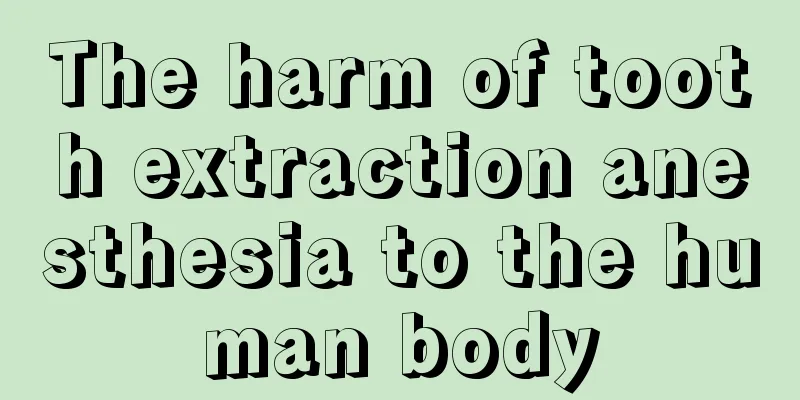The harm of tooth extraction anesthesia to the human body

|
I believe that many people are afraid of tooth extraction, because tooth extraction is to pull the tooth out of the human body's root, so the process will cause some pain. However, many dentists choose to play mahjong with patients when they are extracting teeth for them, which will make the patients feel less painful during the extraction process. But if a person is given anesthesia during tooth extraction, what kind of harm will it cause to his body? Anesthesia for tooth extraction is harmless to the human body. The anesthesia is only local and will not affect other parts of the body under appropriate dosage and operation. Therefore, we don’t need to worry about the side effects of anesthesia for tooth extraction. So, what is local anesthesia? Local anesthesia is the use of local anesthetics to temporarily block nerve conduction in a certain area of the body to produce an anesthetic effect, referred to as local anesthesia. Local anesthesia is simple and easy to perform, safe, can keep the patient awake, has little interference with physiological functions, and has few complications. Suitable for small and medium-sized surgeries that are relatively superficial and limited. However, when used for large-scale and deep surgeries, the analgesia is often not perfect and the muscle relaxation is poor. When used for uncooperative patients, especially children, basic anesthesia or auxiliary anesthesia must be added. Therefore, its scope of application is subject to certain limitations. Possible side effect of anesthesia for tooth extraction is fainting. Some patients suddenly experience dizziness, chest tightness, pale complexion, cold sweats all over the body, cold and weak limbs, a rapid and weak pulse, nausea, and even difficulty breathing and brief coma when receiving anesthesia injection. This is medically known as syncope. Syncope is generally caused by internal factors such as excessive fear, hunger, fatigue and poor overall health of the patient, as well as external factors such as pain and improper posture that cause temporary cerebral ischemia. Therefore, effective measures to prevent syncope include effective communication with doctors before and during surgery, understanding the treatment process, eliminating excessive tension, and avoiding surgery on an empty stomach. It can be seen that generally speaking, there are no side effects of anesthesia for tooth extraction, because the dosage is very small and will not cause harm to the human body. However, if some people have weak constitutions or cannot absorb anesthesia, they may experience fainting or allergies. When this happens, you must seek medical attention in time. But generally speaking, there are no side effects of anesthesia during tooth extraction. |
<<: What diseases does endodontics treat?
>>: Can clarithromycin cure stomach problems?
Recommend
Experts give a detailed introduction to the key points of nursing for pancreatic cancer
Pancreatic cancer is a malignant tumor with a hig...
Is esophageal cancer contagious through saliva?
Some people believe that esophageal cancer is a c...
The cause of colon cancer often causes patients to experience anemia symptoms
Many friends are very concerned about the causes ...
Can I take honey and medicine together?
Recently, I saw a very practical topic on the Int...
Do curling irons do great harm to hair?
Women are becoming more and more professional whe...
Why can you get pregnant during the safe period
Women ovulate once a month, and this period is ca...
How to effectively prevent lung cancer? Try these 3 methods to prevent lung cancer
For diseases, the measures we should take are pre...
Is itchy throat an early sign of lung cancer?
The early signs of lung cancer are usually not an...
Chemotherapy for male breast cancer
Treatment for male breast cancer depends largely ...
Can green tea be boiled
Green tea is not suitable to be boiled. Green tea...
What is Lynch syndrome
Lynch syndrome is a genetic disorder that increas...
How to treat skin cancer with traditional Chinese medicine
How does Traditional Chinese Medicine treat skin ...
Gastric disease and premature beats
Nowadays, many young people suffer from stomach p...
How long can you live after mid-term surgery for lung cancer? Can mid-term surgery for lung cancer cure it?
How long you can live after mid-term lung cancer ...
My stomach feels uncomfortable after eating
The symptom of feeling uncomfortable in the stoma...









